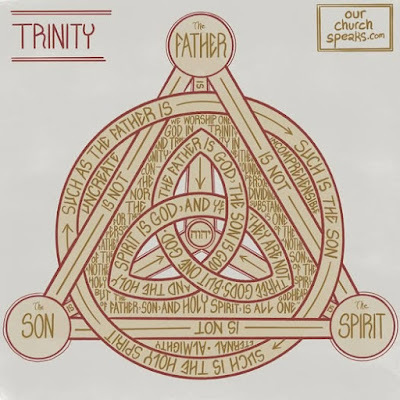Trinity Sunday

June 15, 2025
+ Last Wednesday, I observed the 21stanniversary of my ordination to the Priesthood.
My priesthood is now of legal drinkingage, if it drank.
(It, like me, doesn’t)
And on Friday, with my ordination anniversarystill fresh in my mind, I was reminded of something:
Earlyin my training for the Priesthood, I was cautioned to avoid “lone wolf”ministry, advice I very often blatantly ignored.
Knowingwhen or even how to ask for help when I need it hasoften been difficult for me.
Anexample of my “lone wolf” tendencies happened about a year ago when I thought Icould simply move one of my heavy plastic window-well covers by myself to cut aweed that had grown inside the window-well.
I gotthe cover off without too much trouble but when I tried to put it back I endedup shattering it (in retrospect I realize it was definitely a two person job).
Well,lesson learned.
OnFriday, I ended up asking our very loyal deacon, John, if he could help hischronically “lone wolf” priest on arainy day to pick up and install a new window-well cover.
Whichhe did.
And Iam grateful.
Because,well, I couldn’t have done it on my own.
And ingratitude for that, I’m preaching on Trinity Sunday instead of him.
Usually,at least for the last five years or so, I let Deacon John preach on thisSunday, which he does well.
But,today, I will do it.
*sigh*
So, why my apprehension about the Trinity?
Well. . . when all is said and done, at the end of the day, I cansay this about myself:
I am don’t know how orthodox I am for people.
Let’s face it.
I’m pretty liberal.
And the accusation of “heretic” has been tossed in my directionmore than once.
Probably because, as you all know I am unashamed universalist.
I do believe that, eventually, we will all be together with Christin heaven.
I really do believe that.
I do not believe in an eternal hell.
But despite all of that, I am actually a pretty “orthodox” priest.
I am pretty cut and dry on the other stuff.
I really do believe Jesus is the Son of God.
I really do believe he’s the Word of God Incarnate.
I believe prayer does make a difference in this world.
I believe in the Real Presence of Christ in the Bread and Wine ofthe Eucharist.
And let’s not get into my view of Mary and the saints.
And then, there’s the Trinity.
Sigh.
The Trinity.
Now, I taught Systematic Theology for 10 years at the Universityof Mary
I still teach Religion on a regular basis.
Every time I try to explain it, I find myself nudging over intosome kind of heresy.
Am I doing a Modalist definition?
Or am I guilty of Partialism?
So, to avoid anyone getting that ugly “heretic” accusation lobbed atme. I’m not even going to attempt it today.
After all, I’m just a priest.
I’m not a theologian, nor have I ever claimed to be one.
Most of us, let’s face it, don’t give the doctrine of the Trinitya lot of thought.
Like you, I really don’t lost a lot of sleep over it.
I approach this Sunday and this doctrine of the Trinity as Iapproach any similar situation, like Christmas or Easter or, as we celebratedlast Sunday, the Holy Spirit and Pentecost.
It’s a mystery.
And I love the mystery of our faith.
And let me tell you, thereis nothing more mysterious than the Trinity.
God as Three-in-One—God as Father or Parent or Creator, God as Sonor Redeemer and God as Spirit or Sanctifier.
I know, I know.
It’s difficult to wrap our minds around this concept of God.
The questions we priests regularly get is: how can God be threeand yet one?
How can we, in all honesty, say that we believe in one God when weworship God as three?
Certainly our Jewish and Muslim brothers and sisters ask that veryimportant question of us:
My answer is: I don’t know.
Whole Church councils have debated the issue of the Trinitythroughout history.
The Church actually has split at times over its interpretation ofwhat exactly this Trinity is.
We can debate it all we want this morning.
We can talk what is orthodox or right-thinking about the Trinityall we want.
But the fact remains that unless we have experienced God in a realand somewhat personal way, none of this talk to the Trinity is really going tomatter, ultimately.
And there is the key to everything this Sunday is about.
We can go on and on about theology and philosophy and all mannerof thoughts about God, but ultimately what matters is how we interact with ourGod.
How is our relationship with God and with each other deepened andmade more real by this one God?
That’s what Jesus tells us again and again.
Just love God.
In scripture we don’t find people worrying too much about whetherthey are committing a heresy or not in trying to describe God.
What do we find in scripture?
We find a constant striving toward a more personal and closerrelationship with God.
This is our primary responsibility: our relationship with God.
How can all this talk about God—how can this thinking aboutGod—then deepen our relationship with God?
Our goal is not to understand God: we will never understand God.
God is not some Rubik’s Cube or a puzzle that has to be solved.
Our goal is to know God. In our hearts. Passionately.
Our goal is to love God.
Our goal is to try to experience God as God wishes to be experienced byus.
Because God does know us.
God does love us.
And, more likely than not, we have actually experienced our God inmore than one way more than once in our lives.
I personally have experienced God in what I would call atri-personal kind of way (I don’t know what heresy that might be, but I reallydon’t care)
I personally have experienced God as a loving and caring parent,especially when I think about those times when I have felt marginalized bypeople or the Church or society or by friends and colleagues.
I have also known Jesus as my redeemer—as One who, in Jesus, hascome to me where I am, as Jesus who suffered in a body and who, in turn, knowsmy suffering because this One also has suffered as well.
And this One has promised that I too can be, like Jesus, a childof this God who is my—and our—Parent.
I have been able to take comfort in the fact that God is not somedistant deity who could not comprehend what I have gone through in my life andin this limited, mortal body.
In Jesus, God knows what it was to be limited by our bodies.
There is something wonderful and holy in that realization.
And I have known the healing and renewal of the Spirit of God ofmy life.
If that’s the Trinity—and certainly that’s the Trinity I haveexperienced in my life—then, it’s wonderful!
If all we do is ponder and argue and debate God and God’s nature,we’ve already thrown in the towel.
And we are defeating the work of God in this world.
But if we simply love God and strive to experience God throughprayer and worship and contemplation,that is our best bet.
No matter what the theologians argue about, no matter what thosesupposedly learned teachers proclaim, ultimately, our understanding of Godneeds to be based on our own experience to some extent.
Yes, God is beyond our understanding.
Yes, God is mysterious and amazing and incredible.
But God does not have to be a frustrating aspect of our faith.
Our experience of God should rather widen and expand our faithlife and in our understanding and experience of God and, in turn, of eachother.
And that’s where I’m going to leave the whole issue of theTrinity.
Ok. I’ll say one more thing about theTrinity.
Every year, on Trinity Sunday, I placethe Andrei Rubelev’s famous icon of the Trinity in the nave
In it you’ll findthree angels seated at a table.
According to sometheological interpretations, these three Angels represent the three Persons ofthe Trinity.
In the icon we cansee that all three Angels are shown as equals to each other.
In a sense, this iconis able to show in a very clear and straightforward way what all our weighty,intellectual theologies do not.
What I especiallylove about the image is that, in showing the three angels seated around thetable, you’ll notice that there is one space at the table left open.
That is the space foryou.
In a sense, we are,in this icon, being invited to the table to join with God.
We are being invitedto join into the work of God.
And I think that iswhy this icon is so important to me.
It simply allows me to come to thetable and BE with God.
It allows me to sit there and be onewith God.
No need to wrestle, or debate, or doubt God.
And we realize, certainly in our ownlife here at St. Stephen’s, that, like this ikon, God is still calling to us tobe at the table with God.
Here, at this altar, we find God,inviting us forward.
And from this table, at which we feastwith God, we go out to do the ministries we are all called to do.
Today, as we ponder God—as we consider how God has worked in ourlives in many ways— and who God is in our lives, let us remember how amazingGod is in the ways God is revealed to us.
God cannot be limited or quantified or reduced.
God can only be experienced.
And adored.
And pondered.
God can only be shared with others as we share love with eachother.
So, let us sit down at that table.
Let us bring our doubts anduncertainties with us.
And let us leave them there at thetable.
Let us let God be God.
When we do that—when we live out and share our loving God withothers—then we are joining with the amazing and mysterious work of God who ishere with us, loving us with a love deeper than any love we have ever knownbefore.



